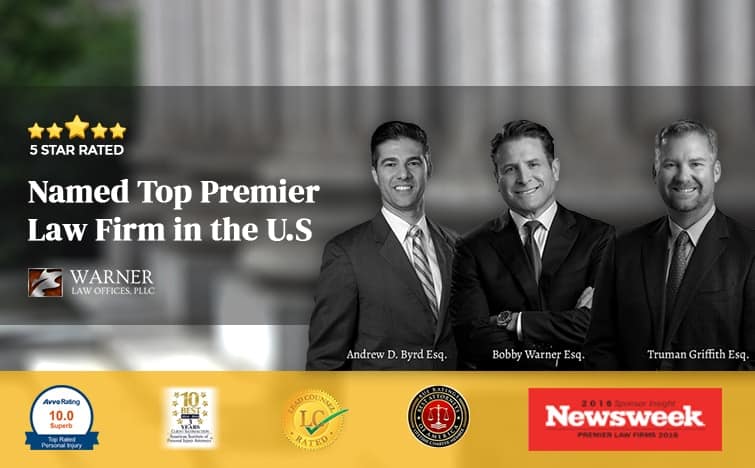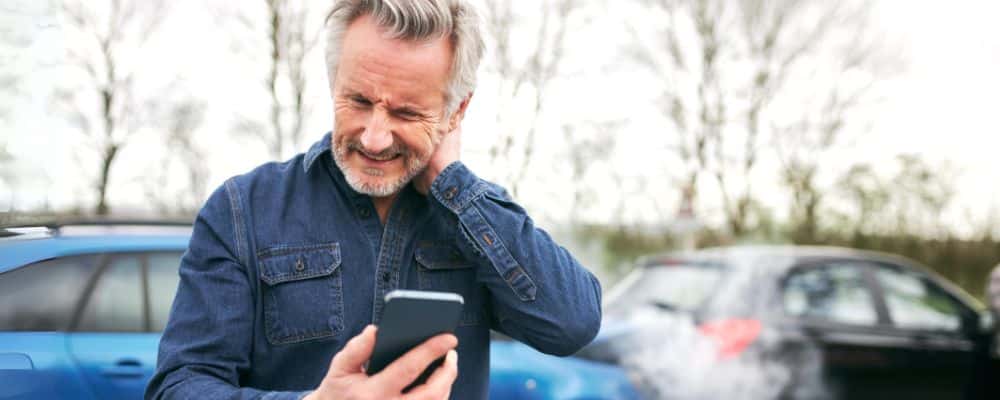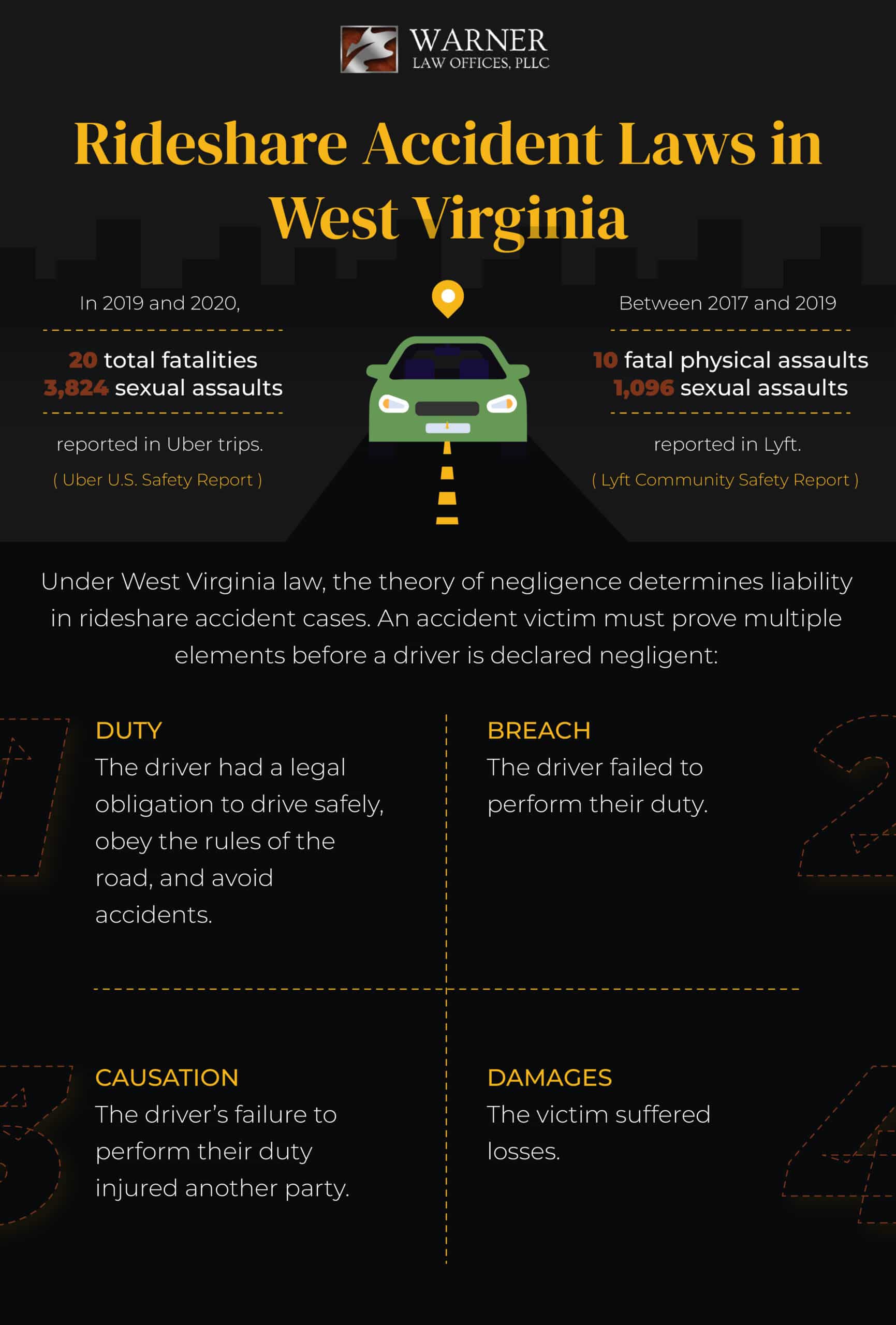Uber & Lyft Accident Lawyer
in West Virginia
You might know exactly what to do following a car accident if you were behind the wheel when it occurred. But what about if you were a passenger in a rideshare vehicle at the time of the crash?
With the rising number of Uber and Lyft users comes an increase in rideshare car accidents. A rider who gets hurt in one of these incidents can pursue an injury claim against the driver responsible. Bobby Warner and the team at Warner Law Offices, PLLC, can help. If you or someone you know suffered an injury from a rideshare car accident, Warner Law Offices in Charleston, West Virginia will fight for you. Contact the team today for a free consultation.
- How Can an Accident Lawyer at Warner Law Offices Help?
- Types of Rideshare Accidents
- Causes of Rideshare Accidents
- Who Is Liable in an Uber or Lyft Car Accident?
- Rideshare Accident Laws
- Uber and Lyft Insurance Requirements
- How Long Do I Have to File a Rideshare Accident Claim?
- Contact Warner Law Offices, PLLC
- Meet Our Attorneys
How Can an Accident Lawyer at Warner Law Offices Help?
Hiring a personal injury lawyer post-auto accident can be beneficial for many reasons, the first being that they have extensive experience. The rideshare accident lawyers at Warner Law Offices know and understand what is necessary to prove fault and liability in West Virginia. They can help you gather all evidence needed to do so.
Second, the experts at Warner Law Offices will appropriately value your claim based on financial losses and non-financial damages. Insurance companies want to settle your claim for as little as possible. The car accident lawyers at Warner Law Offices, PLLC won’t let them. We will ensure you don’t walk away with less than your case is worth. The skilled negotiators on our team will handle all settlement negotiations, so you don’t have to.
If a settlement can’t be reached, don’t worry. Our team of experienced and talented trial lawyers in Charleston won’t hesitate to take your case to a jury to get you the compensation you deserve. We never back down from a fight for our clients.

Types of Rideshare Accidents
There are many kinds of rideshare accidents. These occur both intentionally and unintentionally and have multiple causes, including driver negligence, driving under the influence of drugs or alcohol, defective vehicles, or dangerous road hazards. Common Uber and Lyft accidents include the following:
- T-bones: T-bone crashes are also called broadside collisions or side-impact crashes. They occur when one vehicle crashes into the side of another head-on.
- Hit-and-runs: A hit-and-run accident occurs when someone hits a vehicle, personal property, or animal. Then, they drive away without providing insurance details, contact information, or any kind of identification.
- Sideswipes: A sideswipe occurs when one car hits, scrapes, or otherwise makes contact with the side of another while traveling in the same or opposite directions. Sideswipes can happen when both cars are in motion or when just one is moving.
- Single-car accidents: Single-car accidents involve only one vehicle. These incidents can happen in various ways, from driving off the road and colliding with an object to hitting debris in the street.
- Rear-ends: A rear-end collision occurs when one vehicle crashes into the back of another. Both vehicles can be moving, or the impacted car can be at a standstill.
- 20+ Years of Experience
- Award Winning Law Firm
- No Fees Unless You Win
- Millions Won For Our Clients

Causes of Rideshare Accidents
A rideshare accident can occur for one or a few reasons. The Uber or Lyft driver, or the driver of another car on the road, may be guilty of:
- Distracted driving: Drivers may use their smartphones while operating their vehicles, leading to accidents and injuries.
- Disobeying traffic rules or regulations: From speeding to failing to use a blinker, drivers who disobey traffic rules create dangerous roadways that lead to accidents.
- Lack of experience: Uber, Lyft, and other rideshare services set specific criteria for drivers to meet before they can begin working. But even with those in place, a driver might not be prepared to handle tricky situations or confusing locations.
- Driving under the influence: Drunk driving affects decision-making skills and judgment and impairs the senses, making the driver a danger to everyone around them.
- Driving while exhausted: Driving while fatigued can be just as dangerous as operating a vehicle under the influence. An overtired driver can cause serious injuries.

Who Is Liable in an Uber or Lyft Car Accident?
The short answer: if you were a passenger in an Uber, Lyft, or other rideshare vehicle and got hurt in an auto accident, you are generally not liable for the rideshare accident injuries you sustained. But figuring out who is responsible can get tricky.
If another vehicle hits the Uber or Lyft you were riding in, that driver may be responsible for covering the costs of damages or injuries sustained during the accident. However, if the Uber or Lyft driver caused the accident, they are held liable for injuries sustained during the incident.
Sometimes, the driver might deny any fault and refuse to accept liability. In that instance, you can file a personal injury lawsuit and work with a rideshare accident lawyer to prove their liability.

Rideshare Accident Laws
Under West Virginia law, the theory of negligence determines liability in rideshare accident cases. The definition of negligence is failing to engage in actions a reasonable person would if faced with the same scenario. An accident victim must prove multiple elements before a driver is declared negligent:
- Duty: The driver had a legal obligation to drive safely, obey the rules of the road, and avoid accidents.
- Breach: The driver failed to perform their duty.
- Causation: The driver’s failure to perform their duty injured another party.
- Damages: The victim suffered losses.
If you and your Uber or Lyft car accident lawyer build a case proving the rideshare driver’s negligence, they will be financially liable. That means the rideshare driver must cover damages from their personal insurance policy or Uber’s commercial liability policy, depending on the details of the incident.
Uber and Lyft Insurance Requirements
The insurance coverage applicable to your accident will depend on whether a driver was actively using the app and operating as a rideshare vehicle at the time of the accident.
Uber and Lyft require independent contractors who work for them to have personal car insurance. Depending on the driver’s policy, their personal insurance may or may not cover incidents occurring while driving for profit.
Companies such as Uber and Lyft also insure their drivers. However, they only assume financial liability if the driver was on duty and waiting for a ride request when the accident occurred, if the driver was on the way to pick up a rider or was actively transporting a rider. If a rideshare driver was not on the clock during the accident, you must pursue a claim against their own personal insurance policy.
When the drivers are using the app and, on the clock, the amount of coverage will depend on the stage of a ride, such as whether the driver was waiting for a ride request, was en route to pick up a rider, or transporting a rider.
How Long Do I Have to File a Rideshare Accident Claim?
The state of West Virginia enforces a two-year statute of limitations for filing a personal injury lawsuit following an automobile accident. If you wait too long to take legal action, the court will dismiss your case, and you won’t receive the compensation you hoped for.
Even though you may have plenty of time to file a personal injury claim in West Virginia, waiting too long isn’t advisable. The longer you wait, the harder the case will be to investigate and gather evidence to support your claim.
Contact Warner Law Offices, PLLC For Your Free Consultation
If you were involved in a rideshare accident, contact our experienced Uber and Lyft accident attorneys at 304-345-6789 to learn more about your rights and legal options. We have a proven history of getting clients in Charleston and the state of West Virginia the compensation they deserve. With over 23 years of experience and attorneys recognized among the Top 100 Trial Lawyers and Best Attorneys of America, we will guide you through every step of the process for your rideshare accident claim as you focus on recovering.
Consultation

Bobby has received many accolades throughout the years from both his peers in the legal community, as well as the media. The National Trial Lawyers association named Bobby a Top 100 Trial Lawyer and he has been selected as a Member of the Nation’s Top One Percent. Additionally, he has been named a Best Attorneys of America by Rue Ratings, which also named Warner Law Offices to its Best Law Firms of America.

We represent clients across West Virginia and surrounding areas, providing compassionate client service and relentless advocacy in and out of the courtroom.
Call us 304-345-6789 or

Consultation





